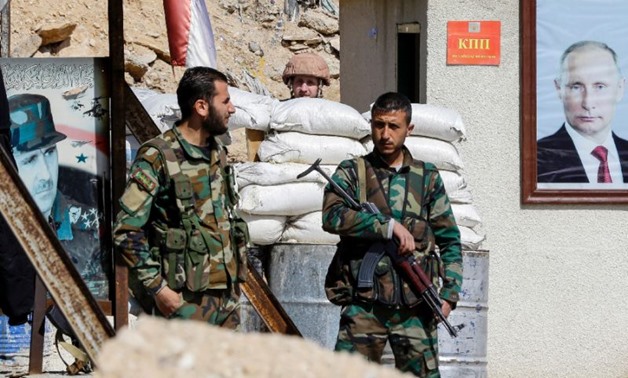
Syrian forces stand next to portraits of Bashar al-Assad and Vladimir Putin at the Wafideen checkpoint on the outskirts of Damascus on March 1, 2018 - AFP
SYRIA - 2 March 2018: Syrian and Russian forces kept up military pressure on rebel-held Eastern Ghouta Thursday as their controversial unilateral truce failed to yield a humanitarian breakthrough.
More than 40 trucks loaded with aid were unable to reach the 400,000 people living in the battered enclave, prompting fresh calls for a United Nations ceasefire to be implemented.
A five-hour daily "pause" announced by Moscow on Monday has led to a reduction in the bombardment that killed hundreds in only a few days and sparked global outrage last month.
But a corridor offered by Russia for civilians to flee remained ostensibly empty for a third day running, with distrust running high on both sides.
Jan Egeland, the head of the UN's humanitarian taskforce for Syria, said he hoped aid convoys "may now be able to go to Eastern Ghouta in the next few days."
He told reporters in Geneva that he had received word during a taskforce meeting on Thursday "that we may have the first facilitation letter, permit from the government, to go to (the main Eastern Ghouta town of) Douma in a very long time."
But he also stressed that "five hours is not enough".
Syrian aircraft carried out strikes Thursday before the 9:00 am start of the daily "truce", killing nine civilians, according to the Syrian Observatory for Human Rights, a Britain-based war monitor.
Ground battles were also taking place in Al-Shaifuniyah which lies in the enclave's northeastern region and has been extensively destroyed in recent days.
A spokesman for the Syrian Civil Defence volunteer rescuers, known as the "White Helmets", said access to the area had been very difficult.
"There is hardly any life there. It is completely destroyed and there are people under the rubble," Siraj Mahmud told AFP.
- Rescue effort -
Air strikes have eased compared with last week when the joint Syrian and Russian aerial campaign against Eastern Ghouta killed up to 100 civilians a day.
But the death toll for the assault launched on February 18 continued to mount even after Russia's "humanitarian pause" kicked in, as rescuers found bodies they had been unable to access.
In the town of Hazeh, rescuers working with rudimentary equipment were painstakingly hoisting buckets of gravel from a basement where they feared up to 21 were buried alive by a strike on February 20.
They have only retrieved six bodies so far.
"I left my daughter in the basement with her husband and his family," said 60-year-old Abu Mohamed.
"I came back the next morning. I found the building collapsed and until now I haven't found my daughter nor her husband's family."
According to the United Nations, three quarters of all private housing in Eastern Ghouta have been damaged and hundreds of civilian need life-saving medical evacuations.
The Russian daily "pause" falls far short of a 30-day ceasefire voted for by the United Nations Security Council on Saturday and yet to be implemented.
UN agencies and aid organisations have argued that the five-hour window was too short for aid deliveries.
"When will your resolution be implemented?" top UN relief official Mark Lowcock asked Security Council members Wednesday.
Russia and its allies in Syrian President Bashar al-Assad's regime have blamed the humanitarian deadlock on the armed groups controlling Eastern Ghouta.
- Pakistani couple -
Syrian state media and military sources accused anti-regime forces in Eastern Ghouta of deliberately shelling the designated safe passage to prevent civilians from leaving and keep them as human shields.
A spokesman for Russian military observers monitoring the ceasefire initiative told Interfax news agency that many civilians were trying to leave.
The number of Ghouta residents asking for "assistance and help in getting evacuated from territory controlled by the fighters has increased exponentially over the past 24 hours," Major General Vladimir Zolotukin said.
AFP reporters at the Wafideen checkpoint through which civilians were asked to evacuate the enclave said no movement was reported, however.
The only civilians believed to have fled the enclave since the "pause" took effect are an elderly Pakistani couple who had remained in Ghouta throughout the seven-year conflict but decided to leave when the violence increased.
Mohammad Fadhl Akram, 73, moved to Syria in 1974.
He and his wife, who left on Wednesday and were given shelter at the Pakistani embassy in Damascus, leave two sons, three daughters and 12 grandchildren behind.
"I hope God protects them," said Akram, who wore a warm hat and sported a trimmed white beard, when he spoke to an AFP reporter in the main eastern Ghouta town of Douma this week.
"I don't want anything else," he said.


Comments
Leave a Comment